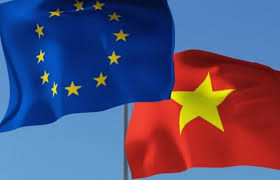
On June 30, the European Union and Vietnam signed a Free Trade Agreement (FTA) and an Investment Protection Agreement (IPA). The FTA is “the most ambitious free trade deal” that the EU has concluded with a developing country and its second with an ASEAN country, following its trade agreement with Singapore. This post presents an in-depth examination of the procurement that the EU and Vietnam will open to one another under the FTA. It builds on an earlier post that compared Vietnam’s procurement commitments in the bilateral FTA and the Trans-Pacific Partnership, which it implemented earlier this year as the renamed Comprehensive and Progressive Trans-Pacific Partnership.
With regard to thresholds (the monetary values at and above which procurement is covered under the FTA), the EU replicates the thresholds that it applies under the WTO Government Procurement Agreement (GPA) and other FTAs: 130,000 Special Drawing Rights (SDRs) for goods and services and five million SDRs for construction services. Vietnam will apply the same thresholds after a 15-year transition period during which it will apply higher thresholds. Its transitional thresholds will start at 1.5 million for goods and services and 40 million for construction services and will be reduced every five years.
For procurement by its sub-central government entities and other covered entities, Vietnam will apply significantly higher permanent thresholds than the EU: one million SDRs for goods and services (in contrast to the EU’s 200,000 SDRs) and 15 million SDRs for construction services, three-times the EU threshold. Vietnam’s transitional thresholds begin at three million SDRs for goods and 40 million SDRs for construction services and will decline over the 15-year transitional period.
Under the FTA, Vietnam will open the procurement of 20 central government entities: 17 ministries, Vietnam Social Security, Government Inspectorate and Committee on Ethnic Minority Affairs, and a number of departments and sub-entities under each. Vietnam limited the coverage of its Ministry of National Defense to listed goods and services, in contrast to the EU’s only listing of defense goods. The EU's defense entities open the same services as other European entities.
The EU generally covers the same central government entities as under the GPA. However, several member states, such as France, Bulgaria and Poland, do not provide Vietnam with access to all the entities that they list under the GPA, an approach that they also apply to certain GPA parties.
Regarding sub-central entity coverage, Vietnam only covers Hanoi City and Ho Chi Minh City and subordinate administrative entities. The EU gives Vietnam access to procurement by cities-regions and certain local contracting authorities "for Member States that do not comprise such cities-regions." The EU also covers contracting authorities that are bodies governed by public law, as in the GPA, but limits Vietnam's access to those entities that provide health or higher education services or carry out research activities. The FTA provides that the parties will “conduct further negotiations on the coverage of additional sub-central government entities no later than 15 years” after the FTA enters into force.
Vietnam lists 42 “other covered entities,” including Vietnam News Agency (excluding procurement in relation to news and documentary production), Vietnam Railways, Vietnam Electricity, two national universities and more than 30 hospitals. The EU provides Vietnam with access to only two of the utility sectors that it covers under the GPA: electricity and railways.
Vietnam excluded a number of goods from its coverage, including rice, oils, a wide range of printed material, automatic data processing machines, magnetic or optical readers, base stations and transmission and radar apparatus.
Vietnam will apply special provisions, including varying thresholds and set-asides, in its purchase of pharmaceutical products. It may set aside annually a portion of its procurement of such products from the FTA’s obligations: 100% of the value of pharmaceutical contracts during the first two years of the Agreement; 65% of the total value in the next seven years; 60% in years 10 to 15, and then 50% from the 16th year. The FTA does not cover Vietnam's procurement of distribution services of pharmaceutical products. In contracts that covers such services, “the successful supplier of that procurement shall have the right to choose any licensed pharmaceutical distributor in Viet Nam.”
Both parties list the services that they cover under the FTA, offering generally comparable services. The EU includes certain limitations with respect to hotel and restaurant services contracts. Vietnam excludes procurement of storage or hosting of government data and related services from its commitments. Both cover all construction services, except for specific exclusions.
The FTA permits Vietnam to provide preferences for small and medium enterprises, except those with more than 500 permanent full-time employees, in procurement contracts for goods or services (excluding construction services), with an estimated value of 260 000 SDRs or less. The FTA also allows Vietnam to request offsets in any form, including price preferences, “up to 40% of the contract value, going down to 30% after 10 years until the end of the 18th year.”
In addition, Vietnam may delay implementation of several provisions of the FTA for up to 10 years. They include not publishing notices of intended procurement by electronic means and charging a fee for access to notices that are made available by electronic means, omitting certain information from notices of intended procurement, providing 25 days (rather than 40 days) for the submission of tenders, and omitting a description of the circumstances justifying the use of limited tendering from post-award notices. For five years after the Agreement is implemented, Vietnam will not be subject to dispute settlement with respect to its government procurement obligations.
The next step for the FTA and IPA is ratification by Vietnam’s National Assembly and the European Parliament, as well as by the respective national parliaments of the EU Member States in the case of the IPA.
Jean Heilman Grier
July 31, 2019
Related Posts
EU-Vietnam FTA: Procurement Commitments
Post Permalink: https://trade.djaghe.com/eu-vietnam-fta-procurement-examined/

